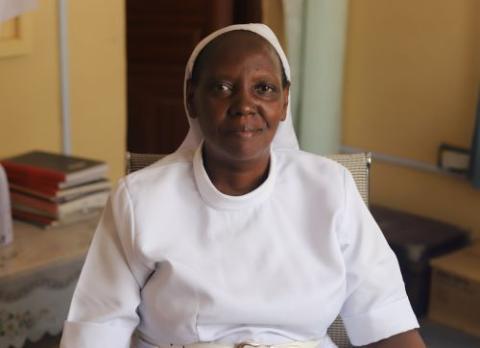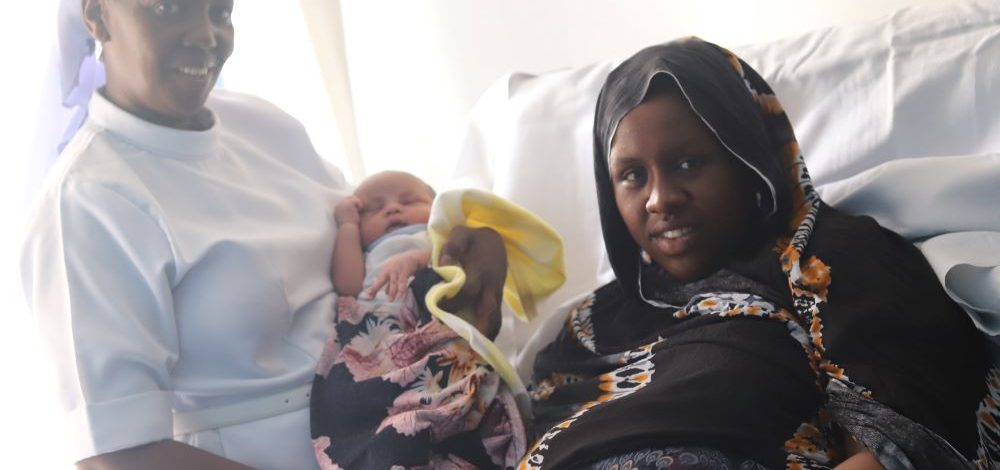ying in her hospital bed, Sabrin Liban thanked religious sisters for helping her safely deliver her baby via Caesarean section at the Kakuma Mission Hospital in this northwestern Kenyan town, 450 miles from the capital, Nairobi.
Liban, a Somali refugee living in Kakuma Refugee Camp, said the hospital, run by the Assumption Sisters of Nairobi, has been a great help to residents and thousands of refugees, especially women seeking obstetric care. In the past, she said, refugees were giving birth in their tents with the help of traditional birth attendants with no medical knowledge, sometimes resulting in injuries or deaths.
The mother of two also said that expectant mothers in the camp and neighboring communities who needed Caesarean sections could end up losing their lives and those of their newborns, as the camp’s hospitals don’t offer the procedure, in which a woman delivers her baby through incisions in the abdomen and uterus.

Sr. Anastasia Murugi, a member of the Assumption Sisters of Nairobi, poses in her office at the Kakuma Mission Hospital. (GSR photo/Doreen Ajiambo)
“I am very grateful to the Catholic sisters; they have saved my life and that of my son,” said the 23-year-old mother who couldn’t hide her joy while looking at her 3-day-old son, wrapped in a shawl and sleeping beside her. “I remember I lost my firstborn three years ago while giving birth due to prolonged labor. I needed to have a Caesarean section, but it was not there.”
Kakuma Mission Hospital, founded in 1964 and owned by the Catholic Diocese of Lodwar, previously offered services that included antenatal and maternity, family planning, child welfare clinics, counseling, treatment for tuberculosis and minor ailments like diarrhea, and testing for malaria and blood sugar levels. But the facility was recently upgraded to a Level 4 hospital, which now offers specialized medical and surgical services.
Murugi, who has worked at the facility more than seven years, said the hospital has been able to save the lives of thousands of residents and refugees, especially during the outbreak of water-borne diseases such as cholera and diarrhea. People in the region also experience communicable diseases such as tuberculosis, malaria and the common cold.
“There are days when we are overwhelmed here, especially when there is a lot of rain and floods,” she said. Those conditions can lead to contaminated drinking water.
Sr. Petronella Mueni, a hospital administrator, said that because the facility offers affordable medical services compared to other hospitals within the region, it attracts thousands of residents and refugees. The need overwhelms her staff and resources.
“Every day, the number of people coming to the hospital keeps growing,” she said. “Many people travel from the camp and other parts of the region to access subsidized medical services at the hospital. This huge number leads to congestion, and many patients share beds in case of admission, which is sometimes not medically advised.”
Mueni, also an Assumption Sister of Nairobi, said the hospital also faces a severe funding shortage. “I’m really struggling to keep this hospital running,” she said. “There is no money. The medical equipment is few, and we sometimes lack basic things like surgical gloves, which is risky.”
However, despite the challenges, the refugees and residents appreciate the sisters’ efforts to offer quality medical care.
“I have seen this hospital save many lives,” said 34-year-old Mary Nafula, who said the sisters saved her brother-in-law from pneumonia two years ago. “Most refugees come here for medical care, but as residents of this region, we have also benefited from the sister’s work.”
She added: “I don’t know where people would seek medical care if it were not for this hospital and the sisters working there.”
Hawa Harun, a 40-year-old refugee from Sudan, agreed. The mother of seven said her 5-year-old son might have died of malaria, if she had not followed her friend’s suggestion to take him to Kakuma Mission Hospital.
“My son was very sick; he couldn’t walk or eat, and he also had a high fever,” she said, noting that it’s common for children to die of malaria in the camp. “I took him to one of the camp hospitals, but the medical care I got in the camp didn’t help him at all; I had to look for an alternative. At one point, I thought it was witchcraft, but he was saved when we got to the Kakuma Mission Hospital.”
By Doreen Ajiambo



Leave A Comment